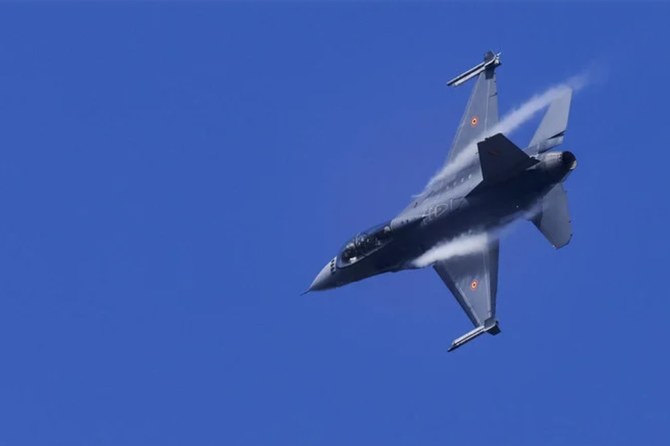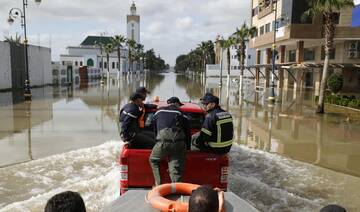ANKARA: Turkiye is confident its long-awaited $6 billion deal to buy F-16 fighter jets will go ahead after the US House of Representatives introduced an amendment to the annual defense budget bill removing a series of hurdles to the sale.
On Tuesday, lawmakers in the US Senate and House reached an agreement on the annual defense policy bill.
The Fiscal 2023 National Defense Authorization Act is set to pass by the Senate and House of Representatives this month before being sent to the White House.
In October 2021, Turkiye made a request to the US to buy 40 Lockheed Martin F-16 fighter jets and about 80 modernization kits to update its existing fleet. However, Washington so far has refused to give a “green light” on the sale, saying that it needs to follow the standard process.
“The removal of articles that tied the sale of fighter jets to Ankara with restrictive conditions from the NDAA draft eliminated an important roadblock for Turkiye’s purchase of 40 new F-16s and 80 F-16 modernization kits from the US,” Ozgur Unluhisarcikli, Ankara office director of German Marshall Fund of the US, told Arab News.
In a letter written to Congress in March, the State Department said the potential sale of the jets and modernization kits to Turkiye would strengthen bilateral ties and NATO’s long-term unity.
“The administration believes that there are nonetheless compelling long-term NATO alliance unity and capability interests, as well as US national security, economic and commercial interests that are supported by appropriate US defense trade ties with Turkiye,” the letter said.
Sentiment toward Turkiye in the administration of US President Joe Biden had softened after Ankara’s mediation efforts during the Ukrainian conflict and thanks to its normalization policy with former rivals, including the UAE, Saudi Arabia, Israel and Egypt.
In an interview with the CNN Turk broadcaster last month, Turkiye’s presidential spokesperson, Ibrahim Kalin, said that US approval for the sale of F-16 fighter jets to Turkiye could be completed in a month or two.
In August, a Turkish technical delegation met in Washington with experts and authorities from Lockheed Martin, while another political delegation along with Turkish diplomats also conducted lobbying activities in the US.
Turkish President Recep Tayyip Erdogan met two US senators — Lindsey Graham and Chris Coons — in New York in September to seek their potential support for the sale.
However, the proposed sale of US weapons to Turkiye has been subject to intense debate after Ankara bought Russian-made defense missile systems, which resulted in its removal from the F-35 fighter jet program along with several US sanctions on its defense sector.
Democratic Senator and Chair of the Senate Foreign Relations Committee Robert Menendez said on Wednesday that he will not approve the sale of F-16 fighter jets to Turkiye and that the final text of the NDAA was not “a win” for Ankara.
According to Sine Ozkarasahin, a security analyst at the Istanbul-based think tank EDAM, the Biden administration is using its political capital to move the debate in a positive direction.
“But there are still many hurdles to be overcome for a potential agreement, and persuading skeptical senators such as Menendez is the most significant of all,” she told Arab News.
The explanatory text accompanying the NDAA bill emphasized that “NATO allies should not conduct unauthorized territorial overflights of another NATO ally’s airspace,” considered by many experts as a warning to the overflights in the Aegean that trigger disagreements between Ankara and Athens.
“Those in the US Congress that want to prevent the transaction have other means to do so, but in return the administration has ways to overcome or circumvent their objection,” Unluhisarcikli said.
“In line with the Arms Export Control Act, US President needs the Congress to not formally object to the transaction. Accordingly, the president needs to notify the Congress 30 days before formalizing a defense sale to a third country, and 15 days in the case of allies including Turkiye,” he added.
Unless Congress adopts a joint resolution of disapproval within those 15 days, the president can sign off the deal.
According to Unluhisarcikli, Congress has never prevented an arms sale through this channel in the past and, given its workload, it is not an easy task to adopt such a resolution in a short time.
“However, there is also a practice in the form of the State Department informally notifying the Congress 20 days before the president’s formal notification. If there are strong objections in the Congress after the informal notification, then the president is unlikely to make the formal notification,” he added.
If the deal to buy F-16 fighters falls through, Ankara may consider other options, including Eurofighters, Swedish Saab fighter aircraft or the latest generation of Russian or Chinese fighters.
“However, Turkiye’s regional rivals, like Greece, are rapidly modernizing their air forces while Ankara remains stuck in the fourth-generation air warfare model,” Ozkarasahin said.
“In the aftermath of its removal from the F-35 program and the changing power balances with its geopolitical rivals, Turkiye urgently needs a stopgap solution until its national combat aircraft takes to the skies.”
The first prototype of Turkiye’s indigenously built fighter jet TF-X recently arrived on the final assembly line. The aircraft is estimated to be rolled out in March 2023 and make its first flight in 2025 or 2026.
Ankara expects US ‘green light’ for F-16 sale
https://arab.news/gpwjh
Ankara expects US ‘green light’ for F-16 sale

- Turkiye’s regional rivals, including Greece, are rapidly modernizing their air forces, analyst tells Arab News
- The Fiscal 2023 National Defense Authorization Act is set to pass by the Senate and House of Representatives this month before being sent to the White House
Morocco’s energy ministry puts gas pipeline project on hold

- The country’s natural gas demand is expected to rise to 8 billion cubic meters in 2027 from around 1 bcm currently, according to ministry estimates
RABAT: Morocco’s energy ministry said on Monday it has paused a tender launched last month for a gas pipeline project, without giving details on the reasons for the suspension.
The tender sought bids to build a pipeline linking a future gas terminal at the Nador West Med port on the Mediterranean to an existing pipeline that allows Morocco to import LNG through Spanish terminals and supply two power plants.
It also covered a section that would connect the existing pipeline to industrial zones on the Atlantic in Mohammedia and Kenitra.
“Due to new parameters and assumptions related to this project... the ministry of energy transition and sustainable development is postponing the receipt of applications and the opening of bids received as of today,” the ministry said in a statement.
Morocco is looking to expand its use of natural gas to diversify away from coal as it also accelerates its renewable energy plan, which aims for renewables to account for 52 percent of installed capacity by 2030, up from 45 percent now.
The country’s natural gas demand is expected to rise to 8 billion cubic meters in 2027 from around 1 bcm currently, according to ministry estimates.













